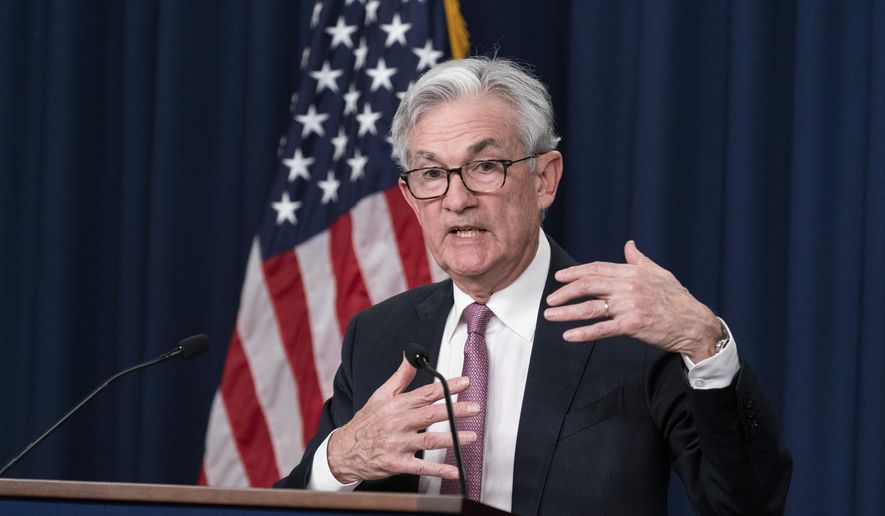The Federal Reserve raised interest rates by three-quarters of a percentage point Wednesday, the biggest increase in nearly three decades, as the central bank scrambles to tame inflation.
After days of speculation, the Federal Open Market Committee lifted benchmark borrowing rates to a range of 1.5% to 1.75% and also signaled that future increases will happen.
“We at the Fed understand the hardship that high inflation is causing. We’re strongly committed to bringing inflation back down. We have both the tools we need and the resolve that it will take to restore price stability on behalf of American families and businesses,” said Fed Chair Jerome H. Powell. “It is essential that we bring inflation down if we are to have a sustained period of labor market conditions that benefit all.”
Mr. Powell said Russia’s invasion of Ukraine is causing upward pressure on energy and food prices and remains outside the Fed’s control.
The Fed also pointed to COVID-related lockdowns in China that are likely to worsen supply chain problems.
The central bank signaled the benchmark rate will end the year at 3.4%, or up 1.5 percentage points from a March estimate. Mr. Powell said the goal is to bring inflation down to 2% while keeping the labor market strong.
“The American economy is very strong and well-positioned to handle tighter monetary policy,” Mr. Powell said.
Yet the series of increases will circulate through the economy, affecting everything from credit card borrowing to home equity loans, and raise fears of a recession.
Stocks gave up some of their recent gains immediately after the Fed’s announcement before rallying as Mr. Powell spoke.
The Fed had been expected to increase rates by 50 basis points but landed on 75 basis points after a Friday report showed inflation was not abating and had reached another 40-year high in May.
“Inflation remains well above our longer-run goal of 2%,” Mr. Powell said. “We decided we needed to go ahead — and so we did.”
The soaring prices of gas, food and other goods is a major drag on American families. Addressing it is a delicate dance for the Fed, which would like to give the economy a so-called soft landing that tames inflation without tipping it into a recession.
But surveys suggest Americans expect inflation to persist, so they might make larger purchases before prices rise — fueling inflation in the process.
Some economists believe a soft landing is no longer possible and the Fed must act aggressively to reel in consumer spending and business activity.
Countries around the globe are struggling with similar trends, and the World Bank recently warned of stagflation — a combination of stagnant growth and inflation.
The Fed on Wednesday also revised its projections for 2022 economic growth, expecting a 1.7% gain in the gross domestic product instead of the 2.8% projected in March.
President Biden, who is suffering politically from high prices at home, insists the U.S. economy will flourish if supply chains can improve in the coming months. Right now, pandemic-addled supply chains are trying to catch up with consumer demand.
The president frequently blames Russian President Vladimir Putin’s invasion of Ukraine for sparking oil and food shortages and increasing prices.
Mr. Biden is reportedly weighing whether to roll back some of the tariffs his predecessor slapped on Chinese goods in a bid to ease inflation by a modest amount.
He also pressed oil companies Wednesday to produce more gasoline, saying refinery profits are “well above normal” and “not acceptable” as Americans pay an average of $5 per gallon.
GOP lawmakers say Mr. Biden failed to tap into U.S. energy sources ahead of the Russian invasion and that Democrats’ $1.9 trillion virus-relief package in early 2021 overheated the economy, worsening underlying problems.
“Despite being warned about the inflationary impact of their spending agenda, President Biden and Washington Democrats turned a blind eye to the pain they were about to unleash on the American people. They rammed through their $2 trillion partisan spending spree and sparked the highest spike in prices in 40 years,” said Rep. Jason Smith, Missouri Republican and ranking member on the House Budget Committee. “The American people cannot afford to keep paying for President Biden’s mistakes.”
• Tom Howell Jr. can be reached at thowell@washingtontimes.com.




Please read our comment policy before commenting.